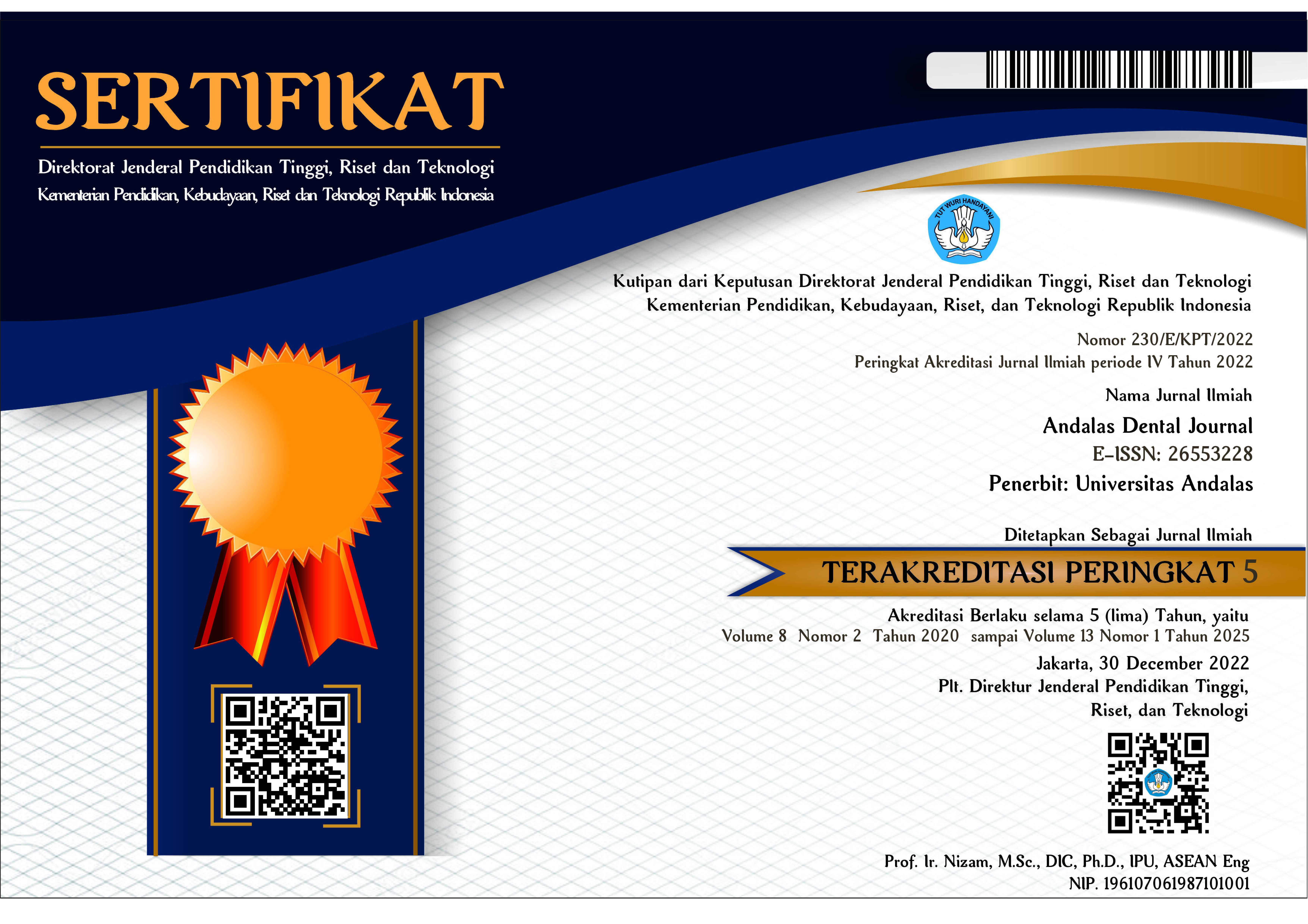Hubungan Pengetahuan dan Sikap dengan Tindakan Mahasiswa Program Profesi Dokter Gigi RSGMP Universitas Andalas Terhadap Pengendalian Infeksi
Abstract
Background: In dentistry, level of risk on cross infection can be said very high. This is due to the teeth treatment, the operator may have direct contact with saliva and patient’s blood. The implementation of standard precautions is very important in clinical practice because in addition to it must be obeyed, it can avoid the operator and the patient to the cross infection. The purpose: To determine the relationship between knowledge and attitudes with the practices toward infection control of clinical student in dentistry. Methods: This type research analytical observasional by cross sectional study approach. The number of respondents were 61 clinical student of dentistry. The sampling technique by simple random sampling. The data collection done by providing questionnaire concerning knowledge and attitudes to clinical student of dentistry and practice observations toward infection control. Statictical analysis use chi-square. Results: There is significant relationship between the knowledge with the practices toward infection control with p=0.0005 and significant relationship between the attitudes with the practices toward infection control with p=0.023. Conclusion: High knowledge and positive attitude will be followed by good practice of control infection.
References
2. Departemen Kesehatan RI. Laporan Hasil Riset Kesehatan Dasar (Riskesdas) Nasional. Badan Penelitian dan Pengembangan Kesehatan Dasar Depkes RI. Jakarta. 2013.
3. Kepel,BJ. Tindakan pencegahan dan pengendalian infeksi pada perawatan periodonsia di rumah sakit gigi dan mulut Unsrat. Jurnal e-gigi. 2015: 3(2).
4. Wibowo dkk, 2009. Proteksi Dokter Gigi Sebagai Pemutus Rantai Infeksi Silang. Jurnal PDGI. Vol. 58, No. 2; Hal.6-9.
5. Arias, KM. Infestigasi dan pengendalian wabah di fasilitas pelayanan kesehatan. EGC: Jakarta. 2010, pp. 113-4. A vailable from URL: https://books.google.co.id/books?isbn:97904 4009X.
6. Shara, AC. Hubungan antara pengetahuan terhadap motivasi dokter gigi muda dalam control infeksi. Media Dental Intelektual Jurnal. 2014: Vol.2 ed.1st.
7. Center for Disease Control and Prevention. Guidline for Infection in Dental Health- Care Settings. MMWR 2003; 52. 2003
8. The Dental Council. Code of practice relating to infection control in dentistry. 57 Merrioj Square, Dublin 2, 2005, pp. 2-29. Available from:URL:http://www.dentalcouncil.ie/files/I nfection_ Conntrol.pdf. Accessed Desember 5, 2016.
9. Lugito, M. Kontrol Infeksi dan keselamatan kerja dalam praktek kedokteran gigi. Jurnal PDGI. 2013; 62(1): 24-30
10. Notoatmodjo. Pendidikan dan Perilaku Kesehatan. PT. Rineka Cipta: Jakarta. 2003.
11. Sardjono B, dkk. Standar pencegahan dan pengendalian infeksi pelayanan kesehatan gigi dan mulut di fasilitas pelayanan kesehatan. Kementrian Kesehatan RI; 2012. Available from URL:http://pdgi.or.id/wp- content/uploads/2015/04/PPIGilut. pdf.
12. Hidayat dkk, Hubungan Antara Pengetahuan dan Tindakan Dokter Gigi dalam Upaya Pencegahan Penyakit Menular. Odonto dental journal. 2016: 3(2).
13. Susila dan suyanto. Metodologi Penelitian Cross Sectional Kedokteran dan kesehatan. Bossscript: Klaten. 2015.
14. Saryono A. Metode Penelitian Kualitatif dan Kuantitatif dalam Bidang Kesehatan. nuhamedika: Yogyakarta. 2013.
15. Cole, M., Breaking The Chain of Infection. Article in Nursing and Residential care. 2012; 14(6): 255-291.
16. Pruss A, Giroult E, Rushbrook P. Pengelolaan Aman Limbah Layanan Kesehatan. 2005. EGC: Jakarta.
17. Kohn W., dkk. Guidelines for Infection Control in Dental Health Settings. 2003
18. Tietjen, dkk. Panduan Pencegahan Infeksi Untuk Fasilitas Pelayanan Kesehatan dengan Sumber daya Terbatas. Yayasan Bina Pustaka. 2010.















